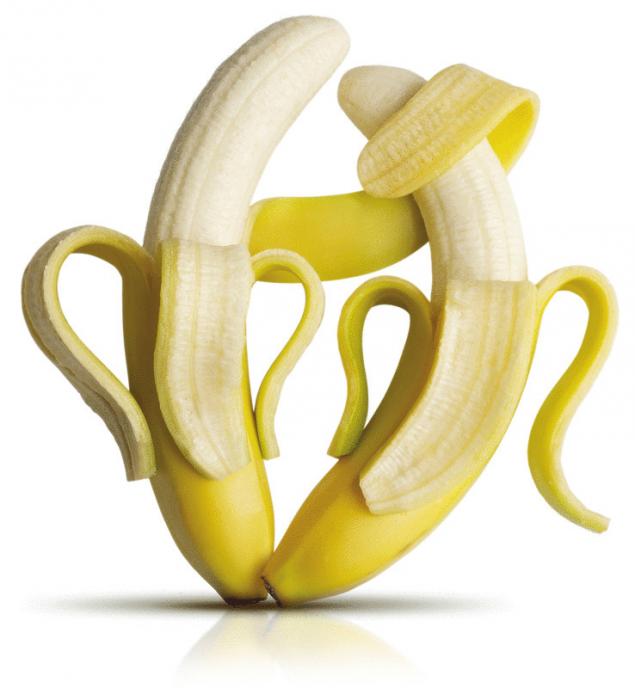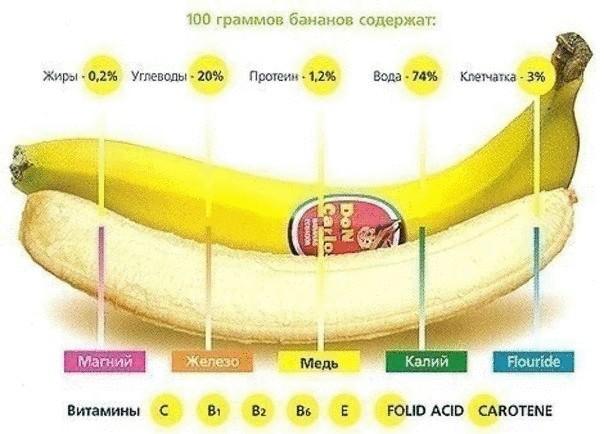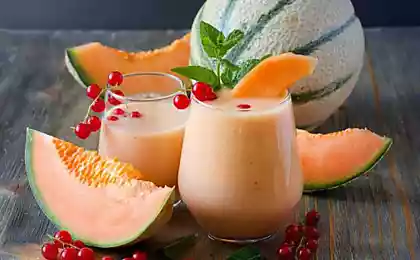448
18 interesting facts about bananas
1. All know bananas grow on trees! But, in fact banana palm tree is nothing like grass. A common misconception comes from the fact that the banana stem is very thick and high, i.e. similar tree structure. Incidentally, banana is the largest herb plant in the world. 2. This fact is also associated with a common misconception and stems from the previous one — the banana is a berry, not a fruit.

3. About 95% of all banana bushes, which are grown fruit comes from a shrub in South Asia. I.e. all commercial banana trees are literally clones of each other. 4. To date, there are about a thousand species of yellow berries, but the vast majority of them are not suitable for food. Only 6 types of bananas are sweet and edible: ice cream, Lady finger, Robusta, Rajapuri, Mysore and Cavendish. We recommend to buy beds online. 5. The most popular variety is the Cavendish, but the palm of this variety holds because he is the best and most delicious, but because in the middle of the last century, the banana variety Gros Michel, which was much sweeter, tastier and bigger was almost completely destroyed. The culprit was a fungus called "Panama disease" which only affected the species plants. After more than 50 years, a similar threat hanging over the variety Cavendish. 6. Almost all varieties of bananas are radioactive because they contain potassium and its isotope potassium-40. 7. In Australia, grown is a very unusual banana variety Goldfinger. Their taste and texture more like apples.

8. For the first time the name Musa, which later became scientific, it was rated banana German naturalist Georg Rumphius, the predecessor of the founder of scientific classification, a Swedish doctor Carl Linnaeus. Linnaeus, making the classification of plants, preserved that name. There are two theories on where the word occurred, but in any case, it's music related. According to the first theory, the name was given in honor of Anthony Muse, a court physician of Roman Emperor Octavius Augustus. According to the second theory, the name comes from the Arabic word "MS" (Arab. موز), which the Arabs called bananas. The word "banana", in tune with all of the modern European languages was apparently borrowed by the Portuguese or Spaniards in the 1590-1600 years of West African languages: Wolof, Mandinka ("banana") or Vai ("bana"). 9. On the Kenyan referendum on the promulgation of the Constitution in 2005, supporters of the project used as its symbol a banana and opponents — orange. 10. The maned wolf is a predatory mammal of the canine — eating bananas. 11. In the 1930-ies in Nazi Germany, bananas were declared "unpatriotic" fruit (necessary for their procurement of currency was used for other purposes). In this campaign, the German doctors acted with "warnings about the harmfulness" of banana, the use of which allegedly leads to a "volvulus". Managers fruit of the shops had banners with the inscription "a True patriot eats German apples". 12. Sometimes a banana is called "banana tree", which is incorrect, because the Palm family (Arecaceae) this plant belongs. 13. The name "banana tree", which is sometimes called a banana, in fact, refers to plants of the genus pawpaw (Asimina) is considered as family (Annonaceae) and due to similarity of fruit of these trees with fruit banana. 14. Like bananas, unripe breadfruit are used as vegetables and Mature, more sweet — like fruit. 15. Most bananas eaten in the African country of Uganda. Every inhabitant of this country in a year is about 220 kg of sweet fruit. 16. The word "banana" in Arabic translates as finger. Therefore, more properly be called not a bunch of bananas, and a brush. 17. Bananas are healthy and nutritious for the body. They contain large amounts of relatively rare vitamin B6, potassium and fiber, as well as a number of minerals: iron, copper, zinc, selenium, magnesium, calcium and phosphorus. It is also believed that those who regularly consume bananas are significantly less at risk of cancer and heart disease. 18. Fruit banana ripen better and taste better if they are to break from the "tree" poluzelenye.
Source: ecowars.tv/

3. About 95% of all banana bushes, which are grown fruit comes from a shrub in South Asia. I.e. all commercial banana trees are literally clones of each other. 4. To date, there are about a thousand species of yellow berries, but the vast majority of them are not suitable for food. Only 6 types of bananas are sweet and edible: ice cream, Lady finger, Robusta, Rajapuri, Mysore and Cavendish. We recommend to buy beds online. 5. The most popular variety is the Cavendish, but the palm of this variety holds because he is the best and most delicious, but because in the middle of the last century, the banana variety Gros Michel, which was much sweeter, tastier and bigger was almost completely destroyed. The culprit was a fungus called "Panama disease" which only affected the species plants. After more than 50 years, a similar threat hanging over the variety Cavendish. 6. Almost all varieties of bananas are radioactive because they contain potassium and its isotope potassium-40. 7. In Australia, grown is a very unusual banana variety Goldfinger. Their taste and texture more like apples.

8. For the first time the name Musa, which later became scientific, it was rated banana German naturalist Georg Rumphius, the predecessor of the founder of scientific classification, a Swedish doctor Carl Linnaeus. Linnaeus, making the classification of plants, preserved that name. There are two theories on where the word occurred, but in any case, it's music related. According to the first theory, the name was given in honor of Anthony Muse, a court physician of Roman Emperor Octavius Augustus. According to the second theory, the name comes from the Arabic word "MS" (Arab. موز), which the Arabs called bananas. The word "banana", in tune with all of the modern European languages was apparently borrowed by the Portuguese or Spaniards in the 1590-1600 years of West African languages: Wolof, Mandinka ("banana") or Vai ("bana"). 9. On the Kenyan referendum on the promulgation of the Constitution in 2005, supporters of the project used as its symbol a banana and opponents — orange. 10. The maned wolf is a predatory mammal of the canine — eating bananas. 11. In the 1930-ies in Nazi Germany, bananas were declared "unpatriotic" fruit (necessary for their procurement of currency was used for other purposes). In this campaign, the German doctors acted with "warnings about the harmfulness" of banana, the use of which allegedly leads to a "volvulus". Managers fruit of the shops had banners with the inscription "a True patriot eats German apples". 12. Sometimes a banana is called "banana tree", which is incorrect, because the Palm family (Arecaceae) this plant belongs. 13. The name "banana tree", which is sometimes called a banana, in fact, refers to plants of the genus pawpaw (Asimina) is considered as family (Annonaceae) and due to similarity of fruit of these trees with fruit banana. 14. Like bananas, unripe breadfruit are used as vegetables and Mature, more sweet — like fruit. 15. Most bananas eaten in the African country of Uganda. Every inhabitant of this country in a year is about 220 kg of sweet fruit. 16. The word "banana" in Arabic translates as finger. Therefore, more properly be called not a bunch of bananas, and a brush. 17. Bananas are healthy and nutritious for the body. They contain large amounts of relatively rare vitamin B6, potassium and fiber, as well as a number of minerals: iron, copper, zinc, selenium, magnesium, calcium and phosphorus. It is also believed that those who regularly consume bananas are significantly less at risk of cancer and heart disease. 18. Fruit banana ripen better and taste better if they are to break from the "tree" poluzelenye.
Source: ecowars.tv/























